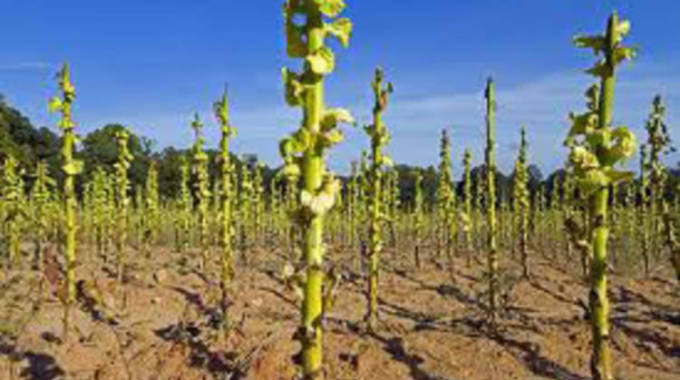
The ManicaPost

Samuel Kadungure
Senior Reporter
THE deadline for destruction of tobacco stalks lapsed on Monday with many fields in Manicaland infested with the crop residue and re-growths, heightening chances of denting the quality of the next crop through viral transmission.
The Plant Pests and Diseases Act (Chapter 19: 08) compels tobacco growers to destroy stalks from their fields by May 15 of every year – but a snap survey in Headlands, Rusape, Nyamajura, Nyazura and Odzi, proved otherwise, with fields still infested with the crop residue and re-growths which act as hosts for diseases and pests like nematodes and spider mites.
Destruction of stalks – either by cutting the stems and ploughing or disking the soil to pull roots out of the soil and expose them to the sun – kills stalks and averts carryover of pests and disease into the next farming season.
The danger of non-compliance by one farmer is that diseases and pests will still affect the next compliant farmers.
Slashing tobacco stalks and spraying the subsequent re-growths with glyphosphate is effective, but many farmers argue that it is expensive.
If tobacco stalks are not destroyed as is the case in most prime tobacco growing areas where farmers are still busy with tobacco grading, while ignoring the statutory directive, associated diseases and pests will likely affect yield quality and increase the farmers’ input costs next season.
Tobacco Industry and Marketing Board (TIMB), said the country can only maximise economic value by sticking to sustainable and responsible production practices.
TIMB is empowered by the Act to take radical action against all errant growers.
Apart from TIMB, errant growers can also be reported to the Department of Research and Specialist Services’ Plant Quarantine Services Institute (PQSI), AGRITEX and Tobacco Research Board (TRB).
TRB plant health services director, Mr Cleopas Chinheya, said farmers should remove stalks to break the cycle of pests.
“This serves as a reminder to all growers to destroy tobacco stalks by the 15th of May. Growers are obliged to set aside a tobacco free period that begins from the aforementioned date. Tobacco stalks are a potent reservoir for pathogens such as Potato Virus Y and bushy top virus. Management of these viruses is subsequent management of aphids and good agricultural practices (including stalk destruction).
“Stalks should be cleared from fields to break the life cycles of pests and pathogens as well as to protect subsequent crops from viral transmission from stalks to seedbeds or fields,” he explained.
Mr Chinheya said seedbed preparation should only start from June 1 and transplantation of seedlings to the field from September 1.
Seedbeds can be destroyed by December 31 or as soon as the seedlings are no longer required.
The Ministry of Lands, Agriculture, Waters, Fisheries and Rural Development said errant farmers will be punished for failing to abide with provisions of the Plant Pests and Disease (Tobacco) regulations SI 711 of 1979.
For contravening regulations requiring the destruction of tobacco plants by a specified date or prohibiting the planting of tobacco plants between specified dates, a grower will be subjected to a fine not exceeding US$100 for each hectare or part thereof in respect of which the offence is committed or imprisonment for a period not exceeding one year or both fine and imprisonment.
Tobacco farmer, Mr David Guy Mutasa said the impact of diseases and losses arising from failure to destroy stalks are a serious concern to the industry and urged the regulators to move in swiftly to enforce the law.
Mr Mutasa said the major reasons for non-compliance include poor supervision, monitoring and enforcement by the regulating authorities, need for an undisturbed soil surface to prevent erosion and non-deterrent fines.
Other growers complain that the stalk destruction process is expensive.



